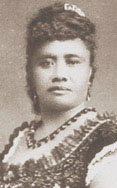Kapu `ihi kapu i Kilohana
Haiamü ihola ka lehua
I nä manu
Hui:
Kulikuli au iä `oe manu kapalulu
Hana wale mai nö ia`u
He aha ho`i `oe i ko`u mana`o
`Ae nö ho`i
`Ölelo ana `oe i ko ha`i ke`e
Eia iho nö me `oe
Nä`aumakua pe`e i ka poli
I a`o lü`au `ia
Ki`ina kahuna i Hawai`i
Kükulu nä ha`ilona
Kuhikuhi ke ola iä Kapo
`O ia nö ho`i
Noho iho nö `oe `ai pono iho
I kou pömaika`i nui
`Ike `ia ai he ulakolako
`O ia nö ho`i

Lili`uokalani
Sacred at Kilohana
The lehua trees is surrounded by
The birds
Chorus:
Be quiet, you quail
Who nags me
You are nothing, in my opinion
Yes, indeed
You talk of the faults of others
Yet there is
An aumakua hiding in your bosom
That is fed sacrifices
The darkness of Hawai`i is consulted
Signs and omens are sought
Kapo is honored
This is so, indeed
Stay and enjoy what you have
Your great blessing
Your prosperity be known
This is so, indeed
Source: Composed in November, 1878, Lessons in life and morality were taught in music and riddles. This is an admonishment from Lili`uokalani to a disparaging remark. The Kilohana in verse 1, stanza 2 is in Kalihi Valley on O`ahu and was the sacred home of Haumea and Wakea. Verse 2, stanzas 3 and 4 is an allusion to the old Hawaiian religion. Although Lili`uokalani embraced Christianity, she was very familiar with the practice of worshipping and feeding na aumakua (family gods). Kapo, the dark sorceress in verse 3, stanza 4, is Kapo`ula`kïna`u, the dual-natured goddess, daughter of Haumea and Wakea, and sister of Pele and Kamohoali`i. Her benevolent nature was Laka, the goddess of hula.